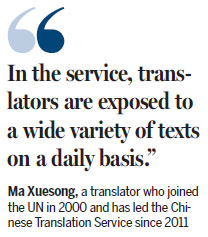

Mandarin is one of the six official languages of the United Nations, and translating documents into all those languages is crucial to the smooth functioning of the UN's machinery.
What makes translating at the UN particularly challenging, though, is that what it produces goes beyond the conference room. Translations of major documents are often cited by the media, quoted in statements and incorporated into legislation for years to come.
Ma Xuesong is one of those who ensure accurate translations. He joined the UN in 2000 after 12 years of diplomatic service with China's Foreign Ministry and has led the Chinese Translation Service since 2011.
The service, part of the UN's Documentation Division, is responsible for translating official documents, meeting minutes and correspondence into Chinese at the UN's New York headquarters.
The documents can cover a broad range of technical, political, scientific, social, economic and legal issues.
"In the service, translators are exposed to a wide variety of texts on a daily basis. Mastering the various topics and the terminology used in translating these topics can be a daunting challenge," Ma said, adding that it means a lot of hard work, especially in the first few years.
"Because of the variety of subjects and the specifications of the organization, you feel like you have to learn everything anew," he said.
In addition to the consistency required by institutional translation, "There is no room for mistakes," Ma said. "If there were a mistake, it would spread like a virus."

The documents are a vivid reflection of international relations and global politics, he said, and his team's goal is to produce translations that are accurate and easily comprehensible, so that Chinese-speaking readers can get fully involved in and contribute to the work of the UN.
"That is the significance of multilingualism, which is essential to achieving international cooperation and understanding," Ma said. "The UN is a platform for debate and discussion among representatives of the 193 member states, rather than only countries speaking one or two languages."
The five other official UN languages are Arabic, English, French, Russian and Spanish.
China is having a considerable effect globally in the areas of trade, finance, business and tourism as the country plays an increasingly important role in the UN. In February, for example, China led an open debate on global peace and security while holding the rotating presidency of the UN Security Council.
"China has been more active in intergovernmental meetings and debates and proposing resolutions on issues of global concern," Ma said. "At the same time, issues discussed at the UN have become more China-related. China, as the second-largest economy and the most-populous nation, also plays a key role in the achievement of UN targets, such as the Millennium Development Goals."
This growing responsibility and involvement in the UN means more challenges and hard work for Ma's staff.
"We have to deal with a variety of texts from any number of areas of expertise under strict deadlines. Every weekday, we have to wait until 7 in the evening before going home, just in case any important documents need to be issued overnight," Ma said.
His staff has 70 people from diverse educational backgrounds, and he said they are all expected to specialize in certain subjects dealt with by the UN.
"It requires a lot of experience and institutional memory," he said. "Besides common sense, (translators) should know the UN documents well. ... Often, they have to mull over the right meaning of texts written by people who are mostly nonnative writers."
Ma said that one of his senior advisers studies legal documents in great depth and reads every Chinese legal publication he can find to keep up to date.
Changes in policy have also meant younger Chinese are now interested in joining the peace-keeping organization, he said. Unlike during the 1980s and'90s, when Chinese working for the UN were rotated every five years, they now are able to work from their early 30s until retirement.
"That has inspired and encouraged the younger generation to work at the UN, and it also means Chinese have better chances to reach more important positions in the organization."
However, people still tend to pay more attention to learning English than improving their native language, he said.
"Translation work requires a perfect command of the mother tongue, which is the most important competence," he said.
lijing2009@chinadaily.com.cn